http://www.zerohedge.com/news/2014-04-27/quest-find-putins-billions
http://globaleconomicanalysis.blogspot.com/2014/04/us-plans-sanctions-on-putins-inner.html
( Still have to see what the US actually does , but signals are for heavier hitting sanctions - stay tuned for the blowback... When the EU does a heavy sanction regime , I think the fur really flies at that point. )
That aside, if Gazprom is shut off from the world, then what's the point of Russia delivering any gas to Europe?
Things can get out of hand in a hurry if the US keeps turning the screws. Desperate people do desperate things. Of course, that is exactly what some warmongers want.
Mike "Mish" Shedlock
and...
http://www.zerohedge.com/news/2014-04-27/pro-russian-forces-parade-osce-hostages-tv-ukraine-air-force-full-operational-readin
http://rt.com/news/155204-ukraine-protesters-tv-station/
http://rt.com/news/155168-us-eu-sanctions-russia/
http://rt.com/news/155136-agents-captured-donetsk-ukraine/
The Quest To Find "Putin's Billions"
Submitted by Tyler Durden on 04/27/2014 19:49 -0400
Just over a month ago, in the latest round of sanctions against Russia, and specifically Putin's inner circle of advisors and lieutenants, one person was singled out - Gennady Timchenko, part-owner of the Gunvor Group commodities trading company, the fourth largest oil trader in the world with over $90 billion in 2013 revenues.
This name was particularly notable because as part of the justification for adding Timchenko to the list of sanctioned oligarchs, the US Treasury said that "Putin has investments in Gunvor and may have access to Gunvor funds." This is curious because in 2008 The Economist also linked Putin to Timchenko. Timchenko promptly sued but later dropped the case, and The Economist issued a statement. “We accept Gunvor’s assurances that neither Vladimir Putin nor any other senior Russian political figures have any ownership in Gunvor."
Yet somehow, despite the repeated denials that Putin has a direct or indirect interest in the massive oil trading company, the Treasury department apparently knows better. As the NYT reports, "Seth Thomas Pietras, Gunvor’s corporate affairs director, said Mr. Putin “does not and never has had any ownership, direct, indirect or otherwise, in Gunvor,” nor is he “a beneficiary of Gunvor,” and “he has no access to Gunvor’s funds.” After the sanctions statement, Gunvor executives flew to Washington to meet with State Department officials and congressional aides. “We’re providing evidence but have not seen any sort of evidence from them yet and don’t know if we ever will,” Mr. Pietras said. He said the company’s banking partners had been satisfied by its explanations.
The Treasury Department, however, was not. “We remain confident that the information on the relationship between Putin and Gunvor is accurate,” said a Treasury official, who asked not to be identified in a public dispute with the company."
Still, whether or not Putin has a stake in Gunvor is of secondary importance - what matters is that tomorrow, as part of yet another round of sanctions by the US Treasury, among those likely to be on Monday’s list, are Igor Sechin, president of the Rosneft state oil company, and Aleksei Miller, head of the Gazprom state energy giant.
Which brings us to the topic of this post, namely the quest for Putin's billions.
Because if there was anything the Gunvor sanction escalation showed, is that the US is not afraid of going those who are in the Putin circle of not only trust but, certainly, money. To be sure, so far the American government has not imposed sanctions on Putin himself, and according to the NYT, officials said they would not in the short term, reasoning that personally targeting a head of state would amount to a “nuclear” escalation, as several put it. But that doesn't mean the Treasury can't go after those who are nearest to Putin, both in terms of power, and certainly money.
The problem, as the US is starting to realize, is that those alleged billions that Russia's leader may (or may not) have access to are quite difficult to track down. There is much speculation and conjecture, but the facts are still rather slim. Here is what is known:
For years, the suspicion that Mr. Putin has a secret fortune has intrigued scholars, industry analysts, opposition figures, journalists and intelligence agencies but defied their efforts to uncover it.Numbers are thrown around suggesting that Mr. Putin may control $40 billion or even $70 billion, in theory making him the richest head of state in world history.For all the rumors and speculation, though, there has been little if any hard evidence, and Gunvor has adamantly denied any financial ties to Mr. Putin and repeated that denial on Friday.
The US may not be sure just where Putin's billions are buried preventing a laser-guided strategy, but that just means it will engage in a shotgun approach and slam all those financiers and oligarchs who are closest to Putin - even those whose goodwill is so critical to keep Russian gas flowing to Germany and the UK.
“It’s like standing in a circle and all of a sudden everyone in the circle is getting a bomb thrown on them, and you get the message that it’s getting close,” said Senator Robert Menendez, Democrat of New Jersey, the chairman of the Foreign Relations Committee, describing at a recent hearing the way the sanctions are getting closer to Mr. Putin.
Still, this does beg the question - is Putin really a billionaire? Officially, of course not.
Mr. Putin’s reported income for 2013 was just $102,000, according to a Kremlin statement this month. Over the years, he has crudely dismissed suggestions of personal wealth. “I have seen some papers about this,” he said at a news conference in 2008. “Just gossip that’s not worth discussing. It’s simply rubbish. They picked everything out of someone’s nose and smeared it on their little papers.”How much Mr. Putin cares about money has long been a subject of debate both in Russia and in the West. On government payrolls since his days in the K.G.B., the Soviet intelligence agency,Mr. Putin to many seemed driven more by power and nationalism than by material gain. With access to government perks like palaces, planes and luxury cars, he seemingly has little need for personal wealth.“If he really does have all that money salted away somewhere, why?” asked Bruce K. Misamore, who was the chief financial officer of Yukos Oil before the Russian government imprisoned its top shareholder, Mikhail B. Khodorkovsky, seized its assets and gave many of them to Mr. Sechin’s Rosneft. “What good does it do him? Is it just ego? Presumably, it’s not to pass it down to heirs. I doubt we’ll see Mr. Putin becoming one of the leading philanthropists in the world.”
Philanthropist, no. But if indeed Putin has highly confidential access to up to $70 billion, that would probably make him the wealthiest person on earth. And thus most influential.
Still, with no hard numbers and org charts highlight Putin's equity stakes and bank accounts around there world, there is mostly speculation:
The C.I.A. in 2007 produced a secret assessment of Mr. Putin’s wealth that has never been released, according to officials who have read it.The assessment, the officials said, largely tracked with assertions later made publicly by a Russian political analyst who said Mr. Putin effectively controlled holdings in Gunvor, Gazprom and Surgutneftegaz that added up to about $40 billion at the time.... the assessment roughly mirrored estimates made publicly at the end of that year by Stanislav Belkovsky, a Russian political analyst with ties to the Kremlin whose public attack on oligarchs several years earlier had presaged the arrest and prosecution of Mr. Khodorkovsky of Yukos.Mr. Belkovsky told European newspapers in December 2007 that Mr. Putin had amassed a fortune of “at least” $40 billion through sizable shares of some of Russia’s largest energy companies. Mr. Putin secretly controlled “at least 75 percent” of Gunvor, 4.5 percent of Gazprom and 37 percent of Surgutneftegaz, Mr. Belkovsky said, citing only unnamed Kremlin insiders.“The reality is that Putin has others and entities to move money that he controls or that he might control ultimately,” said Mr. Zarate, the former Bush adviser. “The challenge with him is you don’t have an easy way of drawing the line to the assets he actually owns and controls currently. There’s a dimension of layering and relationships with people with whom he’s close and entities that serve as conduits that make it tricky to determine what is Putin’s and what is not.”
Then, there is the indirect way of estimating Putin's wealth:
In 2010, Sergei Kolesnikov, a businessman, published an open letter saying he had helped Mr. Putin secretly build a billion-dollar palace on the Black Sea. The Kremlin dismissed his claims as “absurd.” In 2012, Boris Y. Nemtsov, an opposition leader, released a report detailing the presidential perks at Mr. Putin’s disposal, including 20 residences, 15 helicopters, four yachts and 43 aircraft.
Indirect estimates, however, always leave much to be desired:
some hunting for Mr. Putin’s private wealth have found obstacles. Last month, Cambridge University Press declined to publish a book by its longtime author Karen Dawisha, a Miami University professor, exploring how Mr. Putin built “a kleptocratic and authoritarian regime in Russia.” The publisher wrote her saying it had “no reason to doubt the veracity” of her book, but deemed the risk of a lawsuit too high, according to letters published by The Economist. In a return letter, Ms. Dawisha called the decision “pre-emptive book burning.”
Which brings us back to Gunvor, which is sternly denying any relationship with Putin, even as the US Treasury openly rejected this explanation, with its explicit language.
Did Putin have some or all of his billions at the Cyprus-based company? Perhaps, but the cross holdings are so well-hidden not even the NSA likely knows who owns what. Indicating the complexity of Russian-oligarch org charts, here is just a "simple" summary of what Gunvor's stakeholder Timchenko owned, via Bloomberg:
The majority of Timchenko's net worth was derived from his 44 percent stake in Cyprus-based oil trader Gunvor Group, which he sold to partner Torbjorn Tornqvist on March 19, 2014, ahead of U.S. economic sanctions.Through Volga Group, his Luxembourg-based investment vehicle, he also holds 23 percent stake in publicly traded Novatek, Russia's second-largest natural gas producer; a 31.5 percent stake in petrochemical company Sibur; and 80 percent of rail company Transoil.He owns Sibur through the holding company Sibur Ltd. with billionaire partner Leonid Mikhelson. The pair acquired the company from Gazprombank, the lending affiliate of state-controlled energy company Gazprom, in 2010 and 2011. The investment cost is calculated using the value stated by Gazprombank in December 2010, when it sold the first 25 percent for $1.3 billion. He also has an 80 percent stake in Russian construction company Stroytransgaz, which is valued using the average price-to-sales and price-to-book value multiples of three publicly traded peers: Mostotrest, Budimex and Polimex-Mostostal.Through Volga, Timchenko holds stakes in publicly traded Rorvik Timber and Russian Sea Group, a fish farm and seafood processing company, as well as 8 percent of Bank Rossia, 12.5 percent of insurance company Sogaz, 49.1 percent of insurance company Sovag and 30 percent of coal mining company Kolmar. Gunvor holds another 30 percent of Kolmar.Through A-group, the billionaire controls 70 percent of Avia Group, which develops ground infrastructure for the business aviation center at Moscow's Sheremetyevo airport, Avia Group Nord, which provides business-aviation services for flights out of Saint Petersburg's Pulkovo international airport, and a 99 stake in private jet operator Airfix Aviation. He also controls Finland's Hartwall Areena along with billionaire partners Boris and Arkady Rotenberg.
Confused yet? Here is more on the ties between the commodity magnate and the Russian president from a 2008 FT profile:
...many wonder whether Gunvor’s rapid expansion over the past five years – just as the Kremlin has moved in on private oil production – is due to more than just vision. The company has “one very good friend,” a former partner says. “He is at the very top level,” says another.Some have speculated whether there are ties that bind Gunvor’s other co-founder, Gennady Timchenko, and Vladimir Putin, Russia’s president from 2000 until last week. As the company emerges from obscurity, some details of the connections between the two are finally becoming clear. The company claims that it has not benefited from any political favours.The company’s rise provides a glimpse into a secretive clique of businessmen close to Mr Putin who have made immense fortunes under his presidency but have so far stayed far away from public scrutiny. Even as Mr Putin completes a stage-managed transfer to the role of prime minister, installing his hand-picked successor, Dmitry Medvedev, as president, they are finding it increasingly hard to escape the spotlight. This year, Mr Timchenko for the first time made it on to the Forbes rich list with an estimated fortune of $2.5bn.In a scanty paper trail, corporate records from St Petersburg show Mr Timchenko and a committee headed by Mr Putin participated in one business in the early 1990s. Bankers say the company, Golden Gates, was established to build an oil terminal at St Petersburg’s port but foundered in a clash with organised crime.Mr Timchenko’s trading company, meanwhile, was a beneficiary of a large export quota under a scandal-tainted oil-for-food scheme set up by Mr Putin when he worked as head of the city administration’s foreign economic relations committee in 1991, local parliament records show. The trader also built close ties with Surgutneftegaz, a Kremlin-loyal oil company, inviting speculation he may have built a significant stake there.
Keep in mind, this is just one billionaire in Putin's entourage: consider the spaghetti chart of cross-holdings, ownerships and stakes if one charts Putin with all his closest oligarchs. As for those who ended up "less than close" with Putin, just Google Khodorkovsky.
And somehow the Treasury is supposed to keep tabs on all such relationships and track stakeholder interests which in all likelihood were defined only by a verbal arrangement? Of course, it isn't.
Which is why in tomorrow's round of sanctions, the US Treasury will most likely push further and, as rumored, may go as far as the two most powerful men in Russia (behind Putin of course) - the heads of Rosneft and Gazprom.
Will Jack Lew's department finally sink a battleship in its shotgun approach to isolating the financial pawns, knights, bishops and rooks in Putin's chessgame? And if so, what happens if suddenly Putin realizes that the US financial trap may be getting warmer and warmer, and even the nuclear option is being contemplated. Will that be enough to force the former KGB spy to backtrack after over 2 months of opportunities to do just that? Somehow we doubt it, and in fact it will likely accelerate the Russian offensive both in the Ukraine and elsewhere around the world.
If nothing else, though, in a few more months of escalating sanctions of those most near and dear to Putin, if not Putin himself, the world may finally have its first official glimpse of what and where are "Putin's billions."
http://globaleconomicanalysis.blogspot.com/2014/04/us-plans-sanctions-on-putins-inner.html
( Still have to see what the US actually does , but signals are for heavier hitting sanctions - stay tuned for the blowback... When the EU does a heavy sanction regime , I think the fur really flies at that point. )
Sunday, April 27, 2014 12:25 PM
US Plans Sanctions on Putin's Inner Circle, Russia's Third Largest Lender, and Gazprom
Today the US announced more sanctions on individuals, businesses, banks and Gazprom. The one person not targeted is Putin, the alleged perpetrator of the crisis.
Bloomberg reports U.S. Plans to Hit Putin Inner Circle With Sanctions.
Bloomberg reports U.S. Plans to Hit Putin Inner Circle With Sanctions.
Deputy White House National Security Adviser Tony Blinken pledged “news for Monday” on sanctions as the focus on the ground in Ukraine turned to a team of international observers seized by pro-Russian separatists. Among those that may be hit are Russia’s third-largest lender, OAO Gazprombank, development lender Vnesheconombank, and Igor Sechin, the chief executive officer of OAO Rosneft (ROSN), according to people familiar with developments. Sechin is a confidant of the Russian president.It's not clear why striking back at friends and associates of someone who allegedly committed a crime should be legal, but legalities do not stop this president, nor have they stopped any president.
“We will be looking to designate people who are in his inner circle, who have a significant impact on the Russian economy,” Blinken said on CBS’s “Face the Nation” program today. “We’ll be looking to designate companies that they and other inner-circle people control. We’ll be looking at taking steps as well with regard to high-technology exports to their defense industry. All of this together is going to have an impact.”
Representatives of the 28 European Union nations will also meet tomorrow to widen a list of people subject to asset freezes and travel bans, an official from the bloc said yesterday. The sanctions will target 15 Russians in positions of power, another diplomat said. Both asked not to be identified because of the sensitivity of the matter.
“What we will hear about in the coming days is an expansion of existing sanctions, measures against individuals or entities in Russia,” U.K. Foreign Secretary William Hague told Sky News television today. “Already we have seen more than $60 billion of capital flight out of Russia so far this year, and serious falls in the Russian stock market. So no one should underestimate the impact on Russia and Russia’s own interests of continued escalation of this crisis.”
In the wake of those capital outflows and a credit-rating downgrade by Standard & Poor’s, Russia’s central bank unexpectedly raised its key interest rate to 7.5 percent on April 25. The ruble has lost almost 9 percent this year against the dollar, the second-worst performance among 24 emerging currencies tracked by Bloomberg after Argentina’s peso.
Sechin may be among those facing travel bans and asset freezes tomorrow, according to a U.S. official familiar with the situation. Executives at Gazprombank are preparing for possible sanctions, two people with knowledge of the deliberations said last week, while Vnesheconombank is taking precautionary measures, according to a person familiar with talks at the lender.
U.S. Senator Bob Corker of Tennessee, the top Republican on the Foreign Relations Committee, called on President Barack Obama’s administration to impose sanctions on four of Russia’s largest banks and OAO Gazprom (OGZD), the country’s gas-export monopoly.
“It’s going to be more effective if everybody signs on and everybody’s committed,” Obama told a news conference today in Putrajaya, Malaysia. “We’re going to be in a stronger position to deter Mr. Putin when he sees that the world is unified and the United States and Europe is unified, rather than this is just a U.S.-Russia conflict.”
The planned EU moves are not set to include broader trade, financial and economic measures against Russia, known as “stage three” sanctions. Hague said work on those is continuing.
That aside, if Gazprom is shut off from the world, then what's the point of Russia delivering any gas to Europe?
Things can get out of hand in a hurry if the US keeps turning the screws. Desperate people do desperate things. Of course, that is exactly what some warmongers want.
Mike "Mish" Shedlock
and...
http://www.zerohedge.com/news/2014-04-27/pro-russian-forces-parade-osce-hostages-tv-ukraine-air-force-full-operational-readin
Pro-Russian Forces "Parade" OSCE Hostages On TV As Ukraine Air-Force In "Full Operational Readiness" & EU Preps Sanctions 2.0
Submitted by Tyler Durden on 04/27/2014 13:50 -0400
The Ukrainian defense ministry has issued a statement confirming that Ukraine's air-defense forces have been placed in "operation readiness" in the nation's southern regions. This comes on the heels of the pro-Russian separatists taking OSCE observers hostage - and later "parading" them on local TV (where they explained they were not being treated badly). In another odd twist, pro-Russian forces (wearing British militrary fatigues) have taken over the region's TV station based in Donetsk. Twitter rumors suggest there has been a full military mobilization in Kharkiv - yet to be confirmed; but Germany's deputy forign minister Erler confirmed the EU is set to widen "stage-two" sanctions against Russia tomorrow and may discuss further sanctions later in the week.
Ukraine Air-Defense Forces Being Readied...
Ukraine air-defense forces have been placed in “operational readiness” in the country’s southern regions, Defense Ministry says in statement.
- *UKRAINE AIR-DEFENSE FORCES IN `OPERATIONAL READINESS' IN SOUTH
And as The BBC reports, Pro-Russian gunmen in eastern Ukraine have shown seized European military observers to the media, amid attempts to secure their immediate release.
One of the observers presented in the city of Sloviansk said that none of the group had been harmed.A team from the Organisation for Security and Co-operation in Europe (OSCE) is hoping to begin negotiations.The gunmen continue to occupy official buildings in a dozen eastern cities, defying the government in Kiev.As WaPo reports,"We wish from the bottom of our hearts to go back to our nations as soon and as quickly as possible," one of the observers, German Col. Axel Schneider, said at a news conference arranged by his captors.Schneider said the men had "not been touched" and were in good health, but he gave no indication of when they might be freed.
But in another twists, The BBC notes,separatists in Donetsk seized control of the regional television and radio headquarters, demanding that broadcasts by Russian state channels be switched back on, in place of Ukrainian-language services.
Wearing British Military clothes....
http://rt.com/news/155204-ukraine-protesters-tv-station/
Anti-govt protesters seize TV station in eastern Ukraine, call for own channel
Pro-Russian protesters have seized a local state TV station in the city of Donetsk in eastern Ukraine, demanding that Russian TV channels be broadcast there. They also want to launch a “Donetsk People’s Republic” TV channel.
According to media reports, technical work is currently being done at the TV station to restart the transmission of Russian channels. Itar-Tass reports that some Russian TV channels have resumed work in Donetsk.
“Their experts are now setting up equipment on our frequency to broadcast Russian TV channels,”TV station CEO Oleg Dzholos told Ukraine’s Channel 5, Interfax-Ukraine reported.
It has also been reported that pro-Russian protesters have begun talks with the TV center's executives to begin broadcasting the “Donetsk People's Republic” television channel.
“There were many demands. First – switch off Ukrainian channels. I explained that we are Donetsk state TV and radio station and from our central control room, there is only our signal. There were experts and they understood me. The following demand was – not a demand, an ultimatum – to switch on, if I am not mistaken, Russia-24 TV channel,” Dzholos said.
Protesters entered the TV station late Sunday afternoon, saying they were unsatisfied with the way the situation in the region was covered in local news and shows. Protesters demanded that Ukrainian channels be blocked.
They have taken down the Ukrainian flag from the TV station’s office and hoisted the flag of the self-proclaimed Donetsk People’s Republic.
Protesters brought satellite antennas and other equipment and placed guards at the entrance to the television center, Itar-Tass reported.
Prior to taking control of the TV station, over 3,000 people gathered at Donetsk's central Lenin Square. Protesters started the rally with one minute's silence to commemorate Berkut Special Forces officers killed in clashes with radicals in Kiev's Independence Square, and activists killed by Right Sector radicals at a checkpoint in Slavyansk on Easter Sunday.
Russian TV channels have been blocked across Ukraine since the beginning of March, after the Ukrainian media watchdog claimed that shutting down Russian TV stations ensured the country’s“national security and sovereignty.”
At least five major Russian channels, including Vesti, Russia-24, Channel One’s international broadcasts, RTR ‘Planeta’ and NTV World were immediately excluded from the list of options by providers throughout Ukraine.
The move was strongly condemned by the OSCE, which called the move “repressive” and “a form of censorship.”
Since then, the situation in Donetsk has deteriorated, with people demanding a referendum on the region’s autonomy from Kiev. Amid massive protests, when a number of government building were stormed and seized by anti-government activists, Kiev launched an “anti-terrorist” military operation targeting rallying civilians.
http://rt.com/news/155168-us-eu-sanctions-russia/
US failing to push economic sanctions against Russia through EU allies
The new round of sanctions against Russia, which the EU and the US plan to unveil Monday, will not target the Russian economy. Washington said it won’t use economic sanctions without the EU also signing up to them.
G7 members agreed Friday to roll out a third round of anti-Russian sanctions over the Ukrainian crisis. But those would be an extension of the previous two rounds of sanctions, which targeted 33 individuals in Russia and Ukraine and a Russian bank, which the Western government deemed responsible for the crisis in Ukraine or close enough to President Vladimir Putin to have leverage on him.
"What we will hear about in the coming days, what we will agree ... is an expansion of existing sanctions, measures against individuals or entities in Russia," UK Foreign Secretary William Hague told Sky News on Sunday.
The new round will slap travel bans and asset freezes on 15 more people, according to numerous insider reports. But it’s unlikely that they would have any greater effect on Russian policies than the sanctions already in effect. If anything, so far sanctions against the officials have only resulted in mocking calls from Russian MPs, politicians and ordinary citizens to add their names on the blacklists.
Imposing sanctions on some sectors of the Russian economy, which could actually hurt the country, remains an elusive goal for Washington. At the same time America, whose economic ties with Russia are mediocre at best compared to Europe’s, is unwilling to act alone. Otherwise, it would appear that there is conflict between Russia and the US, not Russia and the world, a narrative that Washington is struggling to promote.
"We're going to be in a stronger position to deter Mr. Putin when he sees that the world is unified and the United States and Europe is unified rather than this is just a US-Russian conflict," US President Barack Obama told reporters on Sunday.
But Europe has much to lose from imposing economic sanctions on Russia, and Obama said he sees how US-only sanctions won’t work.
“If we, for example, say that we are not going to allow certain arms sales to Russia, but every European defense contractor backfills what we do, then it’s not very effective,” he said.
With Russia being a major supplier of raw materials and buyer of European goods, the EU governments are far from being eager to shoot themselves in the foot with economic sanctions.
“At the moment there is no consensus among the EU members on which economic measures against Russia would be acceptable, or even if they are needed at all,” a European diplomatic source told Itar-Tass.
The diplomat, who spoke on the condition of anonymity, said only an open military invasion of Ukraine or irrefutable proof of Russian clandestine military presence in Ukraine would tip EU’s stance toward economic sanctions. So far every piece of evidence that Kiev and Washington made public of alleged involvement of Russian agents in Ukraine was either inconclusive or simply false.
The US and the EU are accusing Russia of stirring up anti-government protest in eastern Ukraine and failing to fulfill its obligations under last week’s Geneva statement. They want Moscow to publicly denounce the protesters holding governmental buildings in Ukraine in defiance of a military crackdown launched by Kiev.
Russia insists that it is the post-coup Ukrainian government, which is not making necessary steps to deescalate the violence. Moscow says Kiev must disarm radical nationalist groups, particularly the Right Sector, which toppled the previous Ukrainian government, and start negotiations with the protesters instead of threatening them with tanks and multiple rocket launchers.
If Kiev choses to escalate the crackdown on the protesters by using heavy arms against them Russia says it reserves the right to use its own military to stop bloodshed.
http://rt.com/news/155136-agents-captured-donetsk-ukraine/
Three Ukraine elite Alpha group agents captured in Donetsk region
Three members of Ukraine’s special anti-terrorist unit Aplha have been detained during a covert mission in Donetsk region, amid the buildup of Kiev’s military near the cities controlled by pro-federalization forces.
Commander of the “Donetsk Republic” self-defense forces, Igor Strelkov, has confirmed reports that three members of the Alpha special tactical assault group of the Ukrainian Security Service (SBU) have been detained in the city of Gorlovka, in Donetsk region.
Their task reportedly was to abduct one of the self-defense force leaders, Igor Bezler, whose group is controlling the local police department in Gorlovka, but instead they were captured themselves. The prisoners were searched and blindfolded and brought to nearby Slavyansk, where their guns, documents and IDs as well as other belongings were demonstrated to the media during a press conference.
During questioning, the detained officers revealed that a special unit that has infiltrated the city comprised of seven men.
The captives claimed they had no time for any wrongdoing as they “just arrived” in the city and were getting acquainted with it and investigating approaches for fulfilling their mission, which they admitted was “invariably impossible.”
They did not say however who authorized the operation and was in control of it. They also did not tell where the rest of the group went after they split, or how many similar groups could be operating in the region.
One of the detainees hinted that they were afraid for the wellbeing of their families. “If I did something wrong,” he said, “I think nothing good would happen to my family.” Although there were no direct threats to their families, he said that was because the “mechanism was not launched” as they were abiding by orders.
The members of the Ukrainian armed forces will now receive the status of prisoners of war, Strelkov said, after which an attempt will be made to exchange the commandos for members of pro-federalization activists detained by Kiev.


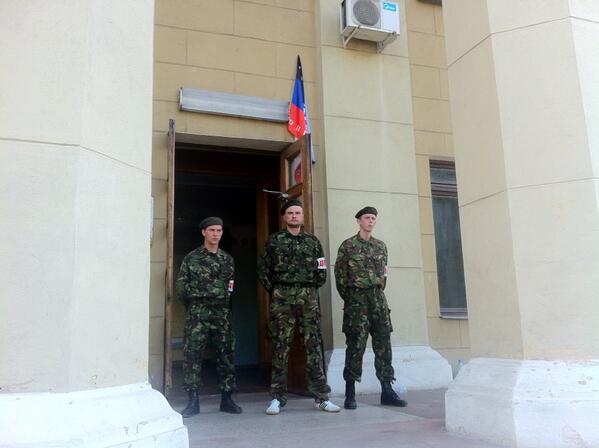



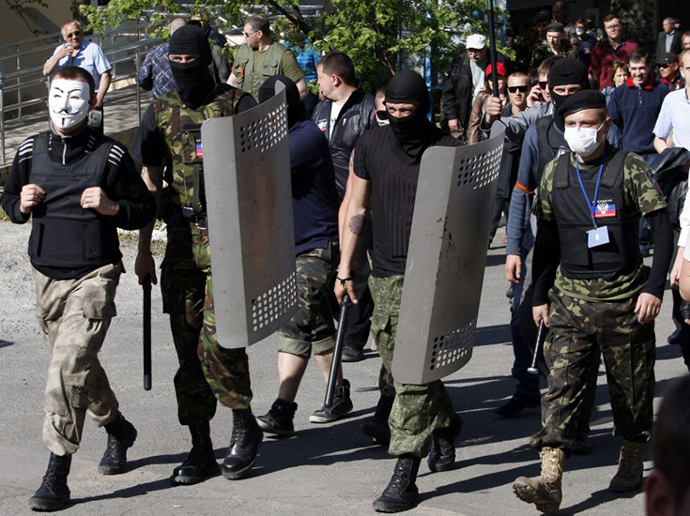
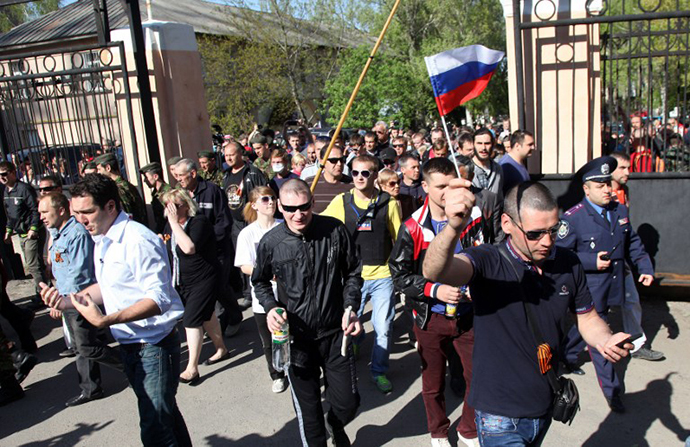
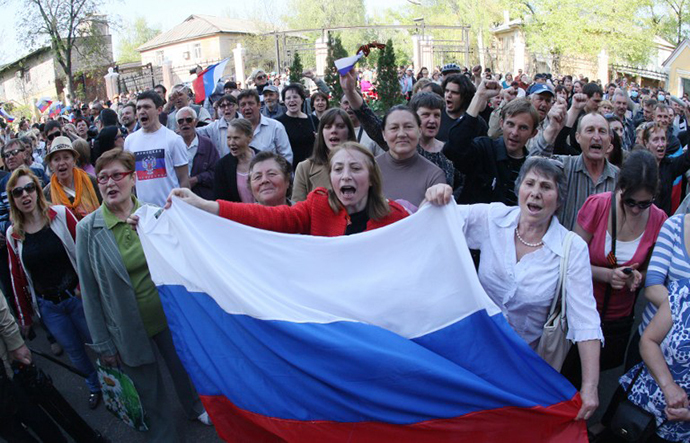
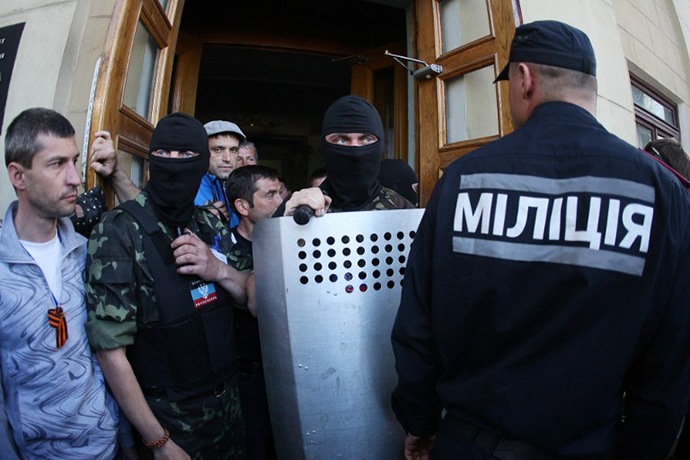
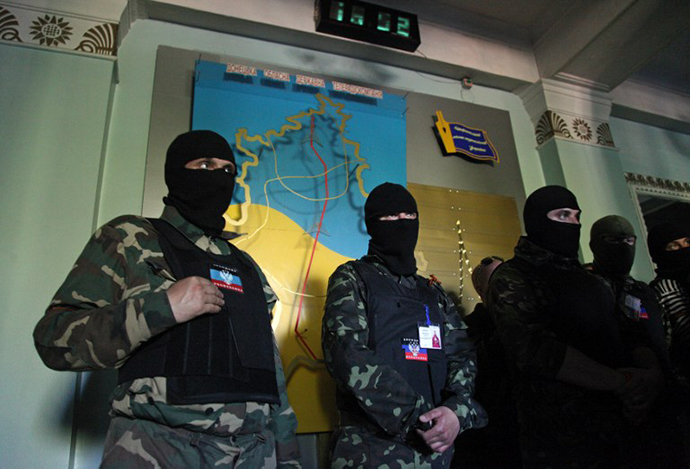











No comments:
Post a Comment